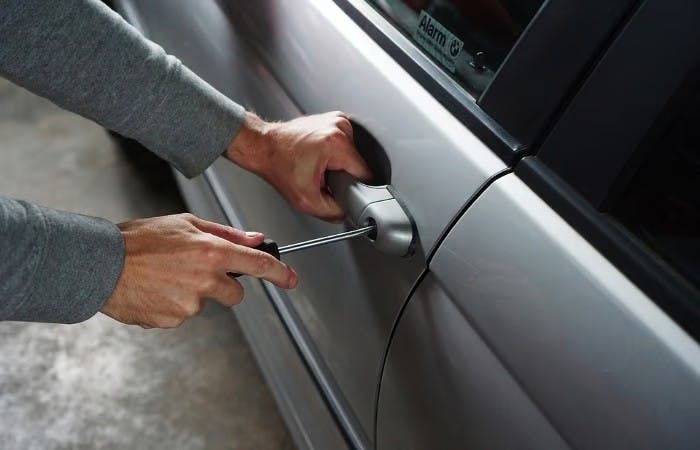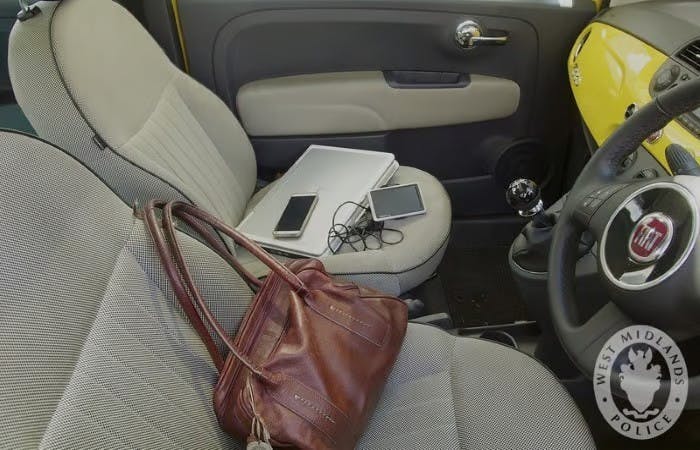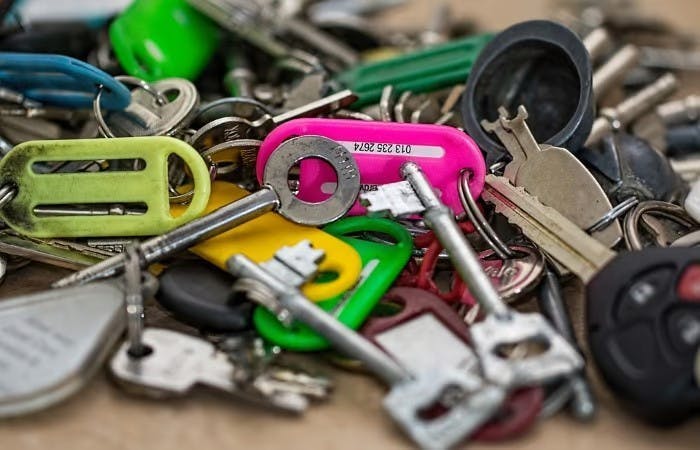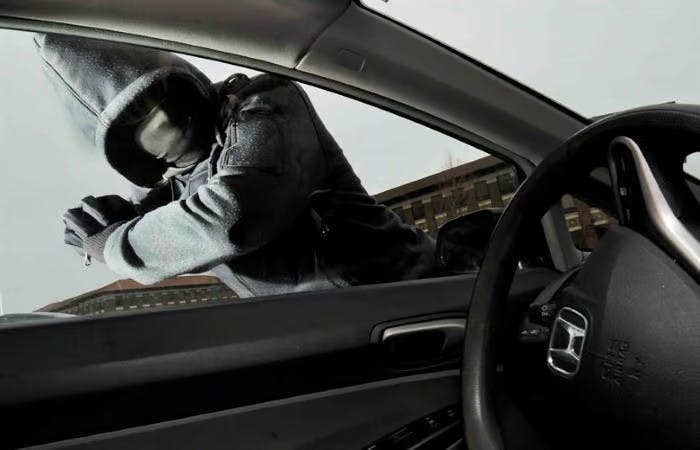
With the amount of faffing about that goes into buying a car, you'd think that hefty insurance premiums would be the worst problem you'd ever have to deal with as a driver. Unfortunately, that isn't quite the case. No matter how many technological advances there are to cars and their security systems, theft is still a big issue that many car owners have to deal with at least once in their lifetime.
We're going to take you through some top tips that will help you keep your car safe and secure—from ways to make your vehicle less of a target, to steps that will make it easier to recover your vehicle in a worst case scenario. Read on to find out more!
Keeping your car safe and secure
As you can imagine, having your car stolen can be quite the bump in the road. For starters, it leaves you without a ride for weeks, or potentially months, if it's not recovered by the police. If you're used to keeping certain valuables in your car, e.g., a sat nav, or important documents, you might not ever see them again. Not convinced it's a problem you'll ever have to deal with? According to Home Office stats, 111,999 cars were stolen between 2017 and 2018, possibly due to the rise in car thieves using more advanced technology.
If you're already shuddering at this nightmarish scenario, you might want to crack open your notebook and start jotting down our advice. Now, some of the tips we're going to list will help you make your vehicle less of a target to potential thieves. Others, however, will help lessen the blow if your vehicle does end up stolen.
Don't keep valuables in your car

Though this might seem like a bit of an obvious point to make, you'd be surprised by just how many people leave their valuables in their car. It's understandable—sometimes it can be a pain to have to remember to empty out your vehicle every time you get out at the end of your day. Trying to be more cost-effective with your time (translation: lazy), however, could, quite literally, cost you.
Unless your windows are tinted, anyone walking past your car can quite clearly see anything you might have on display. If you forget to take out your wallet or sat nav, then, a potential thief could be tempted to take their chances. So, if you're parking your car at home, or elsewhere, make sure you look around the interior of your car before you get out—make sure you haven't left anything valuable out in the open. Take your valuables out of the car with you—or put them in the boot if you're making a stop somewhere.
Now, it's not all about the more obvious valuables either. For starters, you should avoid leaving any bags in your car. Though they might not have anything of value in them, potential thieves might take the risk of breaking in just in case. It's also absolutely vital that you don't keep your important documents inside your car—this includes insurance forms and your vehicle log book. If these documents are inside your car and it gets stolen, the thieves could use them for fraudulent purposes. They could potentially sell or scrap your car!
Register your valuables
Prepare for the worst case scenario and register your valuables so that you can be notified if the police recover them. You can register your valuables for free with the Immobilise Property Register. It works alongside the Police's NMPR and CheckMEND to help reduce crime and return recovered possessions to rightful owners.
Lock it down
Unless you've got a stellar memory, we'd bet that you've had a few goldfish moments in your life. We all do it—we go to bed and wonder if we really did lock the front door, or walk into the kitchen only to forget what we were heading in there for in the first place. In most cases, the consequences for forgetting things are relatively harmless. When it comes to your car, however, it could end up costing you thousands of pounds.
Don't give thieves any chance of getting into your vehicle easily. Double-check that you've actually locked your vehicle. For starters, make sure your windows are rolled up all the way. We get it—with the hot weather, it can be tempting to leave your windows open a crack to keep things ventilated. Doing so could give a thief any easy way into your car, however. So, walk around your car and check that the windows are shut.
If you lock your car with a key fob, we'd strongly suggest checking that your car is actually locked by trying one of the doors. Whilst this might seem a bit redundant, nowadays, car thieves can use technology to jam the signal between your key fob and the car—meaning, your car might not actually be locked. To avoid this happening, use your fob and then check the doors just in case.
Be careful where you park it

As you'd expect, some areas are far more likely to attract higher rates of car theft than others—it's why location plays such an important role in the calculation of car insurance premiums. Of course, whilst you might assume your home is the safest place for your car, it isn't always the case.
At home
When you're parking at home, if you can, you should park it in a garage or driveway—this should repel most thieves, as it would make it difficult to make a speedy getaway. If you can't do either, try to park your car as close to your home as possible—if you can, keep it in line with your window so you can keep an eye on it. Potential thieves are less likely to attempt to steal a vehicle that's easily seen by homeowners and passersby.
Car parks
If you're stopping at a car park, try to pick one that has CCTV. Once you've picked one, you need to choose your spot wisely. If you can, head over to a well-lit spot that has plenty of other cars in the vicinity. Though it might make your bay parking a bit more difficult, it'll help you in the long run. Why? If you park your car off to the side in an empty space, it will make it much easier for someone to steal.
On the road
You should take similar steps if you're parking on a main road or side street whilst heading to the shop or running a quick errand. Pick a spot that's close to a public area or CCTV, e.g., a shop. If your vehicle's in view of other people, criminals might be far less inclined to try and steal it.
Up your security measures
Whilst there's no sure-fire way to prevent anyone from stealing your car, having good security measures in place will certainly make it far less likely. The first level of car security is a steering wheel immobiliser, which takes mere minutes to attach. If you want to up your game, a wheel clamp will make your car even less tempting to steal. If you invest in a car alarm, it will not only deter thieves, but also help reduce your insurance premiums.
Thatcham uses seven security categories for alarm systems—the closer you get to 1, the more secure your car is:
1. Electronic alarm and immobiliser
2. Electronic immobiliser
2/1. Electronic alarm upgrade
3. Mechanical immobiliser
4. Wheel locks
5.Post-theft tracking & recovery systems
6. Stolen vehicle tracking
7. Stolen vehicle location
Q class systems: non-categorised aftermarket security upgrades
A tracking system would be very handy in the event of someone actually getting away with your vehicle, as it would help the police track your car down more easily. If you're still in the midst of sorting out your car insurance, you could kill two birds with one stone by purchasing a black box (telematics) insurance policy. A black box not only helps you reduce premiums—if you keep your driving to a good standard—it can also be used as a tracker.
If you're looking for something a bit more niche, you could invest in microdot security. If your car ends up stolen, then the police can easily identify you as the owner once it's been recovered.
Keep a hold of your keys

You'd be hard-pressed to find a single driver who hasn't, at one point or another, misplaced their car keys. Whether they've fallen between the cushions on your couch or ended up underneath your post, they're pretty easy to fling down and forget about. Unfortunately, such a lackadaisical approach could have serious repercussions. If you leave your keys unattended, whether at home, work or otherwise, someone could quite easily snatch them up.
Try to get into the habit of placing your car keys in a safe place at home, e.g., in a drawer, as opposed to dumping them down wherever you feel like. It's also a good idea to avoid leaving them out in the open where they might be seen through the window.
Don't keep it running
Practically everyone on the road is in a rush. Or at least, that's how it can seem sometimes. We get it—sometimes you just want to speed things up or save time in small ways. That's why a lot of drivers keep their car running whilst they quickly jump out to run a quick errand or run back inside the car to grab something. If you leave your vehicle unattended with the keys in the ignition, however, it's practically child's play for anyone wanting to shoot off with your car.
It doesn't matter how much of a rush you're in, you should never leave your car running. If a thief swings past and steals your car, that's it—you might not ever see it again. Even if you're only going to be out of the car for a minute, it still gives potential thieves plenty of time to get away.
Leaving your car running isn't just an issue because it attracts thieves, it could also invalidate your insurance. Why? Most insurance policies nowadays exclude cover if the driver left their keys in the car or nearby unattended. To avoid this from happening to you, we'd suggest locking your car when you get out and keeping your keys on you at all times.
Be careful with modifications
If you've been mulling over the idea of pimping your ride, you might want to give it a bit of a rethink. In most cases, customising your car—whether for performance or cosmetic purposes—will increase the value of your vehicle. Essentially, it makes your vehicle even more appealing to potential car thieves. Not only that, it can also hike up your insurance premiums exponentially as a result—as it makes you a bigger risk to insure. Not sure what counts as a modification? Here are a few examples outlined by Compare The Market:
- Increasing the performance of your engine: enabling your vehicle to drive at higher speeds increases both the value of your vehicle and the risk of car theft or accidents.
- Getting bigger wheels: changing your wheels to ones that aren't necessarily suited to your vehicle could affect the way you handle your car and also tempt car thieves.
- Altering the bodywork: pretty much any changes you make to your vehicle's bodywork will increase its value and, thus, increase your insurance premiums.
If you've still got your heart set on engine modifications and the like, then make sure you follow the safety and security tips we've outlined!
Establish a routine

So, now you've got some security tips under your belt, it's time to actually incorporate them into your routine. It's not as simple as just following them when you feel like it—you're either all-in, or you shouldn't bother at all. Whilst it might be difficult to remember these steps at first, once you get into the habit, it will become second nature in no time at all.
Before you get out of your car
- Check the interior to see if there are any valuables in sight, e.g, your sat nav, mobile phone, wallet etc. If you're not stopping at home, stow them away until you can take them out of the car.
- Remover any valuable documents you keep inside your car, e.g., insurance documents and your vehicle log book.
- If you're using a steering wheel immobiliser, wheel clamp or alarm system, make sure everything's set before you lock up.
After you get out of your car
- Walk once around your car to check that all of your windows are shut. It doesn't matter how small the gap might be, keep them closed.
- Look through your windows to see if there might be anything that could appeal to a potential thief, e.g., a bag on the back seat, and make sure you remove them.
- Once you've locked your car, double-check by trying to open one of the car doors—better safe than sorry after all!
Though it might seem like a chore to do this every time you get home, it's certainly a better alternative to having your car stolen!
Subscribe for driving advice, offers & more
We'd love to let you know about our courses, news and offers via email. You may unsubscribe at any time.
Star Genie Limited trading as PassMeFast. Company number 10093359
Copyright © 2024 owned by Star Genie Limited
PassMeFast, Blue Tower, MediaCityUK, Salford, M50 2ST

